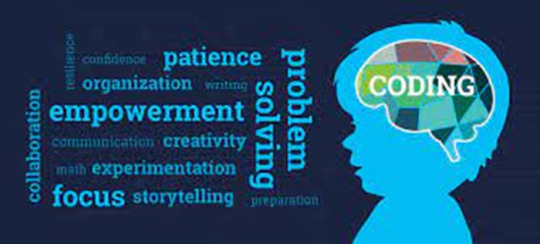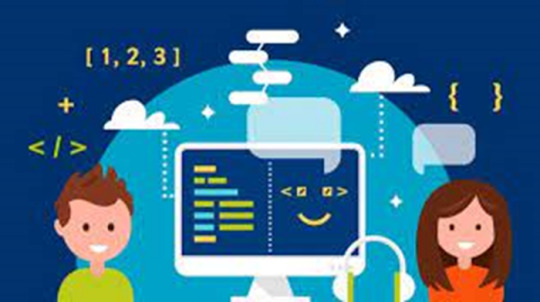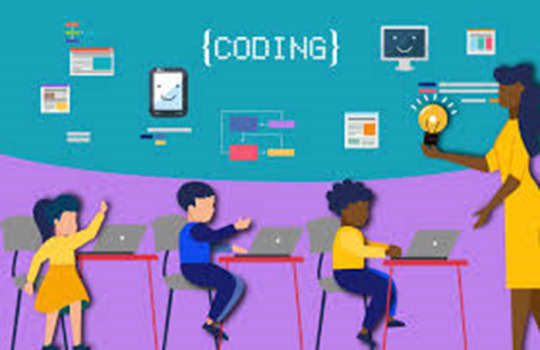Don't wanna be here? Send us removal request.
Text

Coding in the future

Why It’s Important to Start Learning to Code Early Coding is a necessary ability for anyone looking for work in the modern world. Psychologists have discovered that young people learn more quickly and have superior cognitive capacities. Early coding instruction is advantageous since small children learn more quickly. To keep their abilities strong and improve their chances of success in the future, parents should encourage their kids to start learning to code at a young age.
Additionally, parents need to get the appropriate materials so that their kids may learn to code. It would be impossible to expect children to learn coding by decoding complex computer language because doing so would tax their patience and enthusiasm for the subject.
They can get a vibrant, beautiful digital environment from Code Karo yaaro where entertaining and instructive programs create the best learning environment. Additionally, the addition of soft skills like goal-setting, time management, and tenacity helps the child’s overall personality development.
For kids, Code Karo Yaaro provides courses in python programming, artificial intelligence, and web and app development. Every one of our programs is created with the child’s speed and level of comprehension in mind.
The Top 7 Skills Kids can develop while learning to code

The Top 7 Skills Kids Need to Learn
1. Problem Solving
Life skills are a relatively new idea to us, particularly in the context of children. It has always been believed that younger pupils’ skill development should be restricted to academics and, at most, a few sports. But today, educators worldwide have discovered the value of teaching specialized skills to children of all ages. These include sophisticated cognitive abilities like problem-solving and analysis, technical abilities like coding, and social abilities like communication and teamwork. Children can learn how to address even complex problems linked to work, play, and social situations by being exposed to AI and coding platforms, diverse digital media, and robotics.
2. Focus and Intensity
The mind of a child is quite busy. This is a result of all the fresh sensory information they are getting. The best moment to teach them more than you initially believe they are capable of learning is right now!
They are experiencing information overload at the same moment, though. For young children, this makes it challenging to concentrate on a single task. Children benefit from being able to focus on a single task that utilizes their physical, cognitive, and creative abilities through crafting, constructing projects, and coding. So, if a child is having trouble paying attention in class, try teaching them a subject through a craft project. A child who is more focused will learn more and do better on tests and in class.
It’s good for the classroom climate when students feel free to ask questions. However, it’s how you respond and continue to pique their interest that really matters. Make them consider possible answers to their inquiries rather than giving them direct replies by thoroughly going over their queries.
3. Flexibility Although many businesses may have had to adjust to the recent pandemic crisis, flexibility and agility are qualities that every youngster needs to develop owing to the nature of our present world. This entails altering perspectives, rights, objectives, and strategies in order to maximize any given circumstance. Children enjoy routine because it helps them learn what to do. However, children who grow up with strict rules and no freedom for imagination or novel ideas frequently struggle in adulthood.
Students can adjust when their classroom or school setting is occasionally changed. Children’s adaptability can be increased by posing an issue and then adding a twist to the plot. Building a child’s writing proficiency across several languages, especially numerical ones, or honing coding abilities opens up brain regions that can change or adapt swiftly.
4. Self Education
The way that a youngster depends on their instructor is evolving. The ability to self-discipline and study on one's own is new to all of us thanks to online education modules, machine learning, and activities like coding for kids. However, online education will keep growing even after the pandemic. Our pupils will be able to learn in a range of subjects at any age thanks to the numerous new educational opportunities it will contain.
This calls for the capacity for independent study outside of the classroom. Parents should encourage their kids to work on coding and AI platforms, solve crossword puzzles, and produce original material. They will become more self-assured and better able to concentrate and learn as a result.
5. Accepting Difficulties
Children that shy away from difficult situations won’t be able to flourish in the future. Taking on a task requires a variety of abilities, including concentration, adaptability, critical thinking, and confidence.
Students that enjoy challenges are also effective at taking the initiative, leading teams, and working as a team. These serve as the foundation for the next inventors and businesses. Encouragement of children to only make attempts rather than pass judgment on results promotes quick recovery from setbacks and resilience. They ought to be encouraged and supported as they make progress toward the goal at each stage.
6. Interaction
Students can benefit in their academic, professional, and personal life by having the capacity to express themselves, collaborate with others, and effectively interact with others. In the past, technical students, like engineers or IT specialists, were not expected to put an excessive amount of emphasis on communication. We now live in a global world, and there is more communication and contact between people, businesses, and nations.
Teaching communication skills starts at a young age. As young as three years old, children can begin to learn how to read social signs, listen and understand, and express themselves nicely and confidently. As a youngster gets older, they can start learning constructive strategies to bargain, talk, settle disputes, and negotiate without becoming irate or confrontational.
7. Technical Competences
It’s critical to understand how everything functions as the world transitions to an AI-supported environment. Applications, constraints, and capabilities of AI are constantly evolving. Early exposure to AI and coding will give students an advantage over their contemporaries.
For today’s youth, learning technical skills comes naturally. They have little trouble understanding how android phones, laptops, and software operate. But for students hoping to enter any field of work in the future, knowing how to code and fully grasping machine learning and AI are abilities that offer an excellent foundation.
for more information on learning to code for kids check the:
codekaroyaaro.com
1 note
·
View note